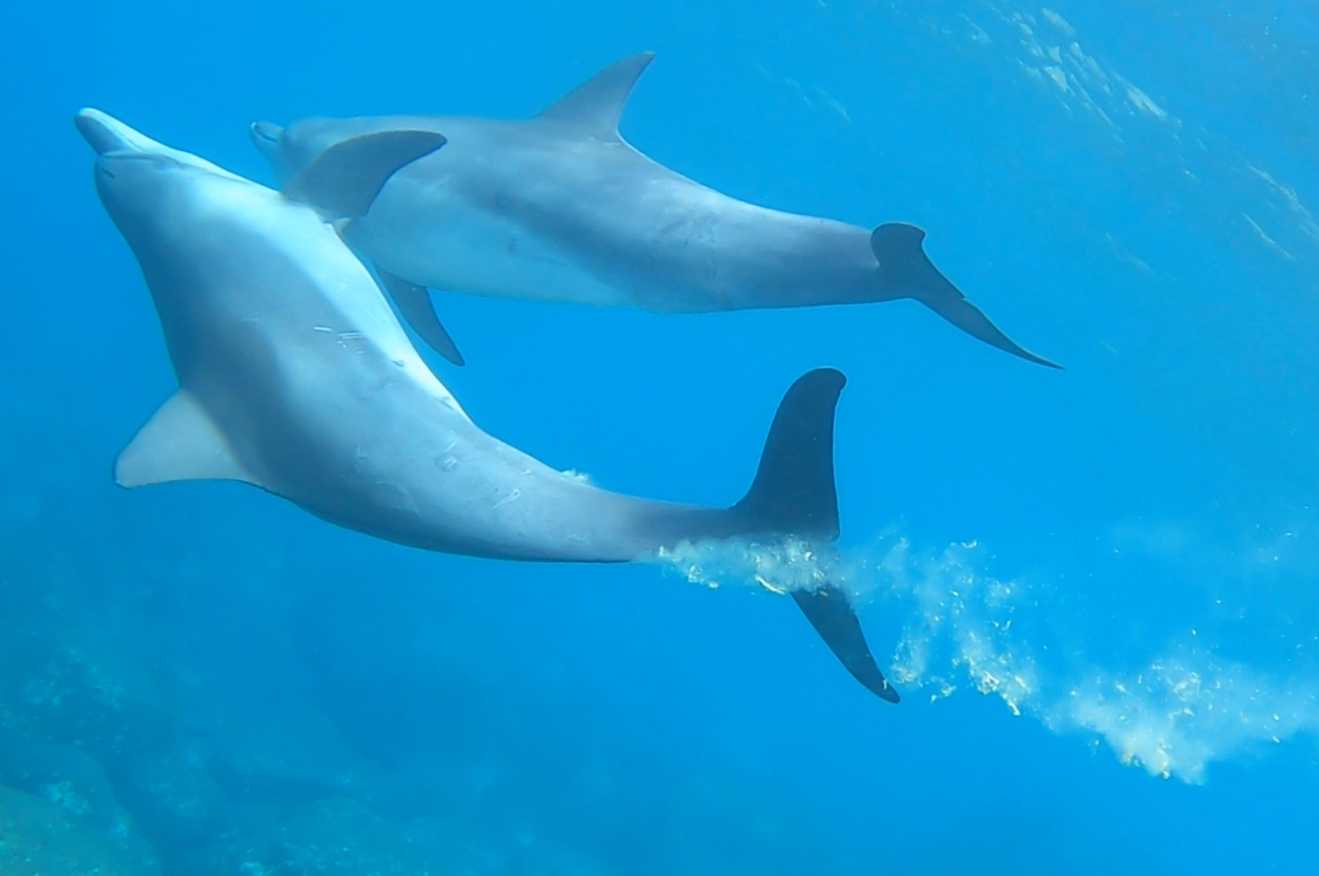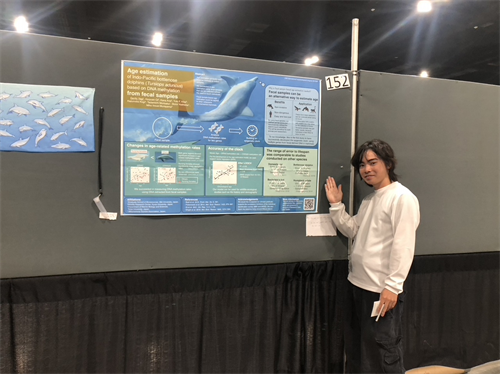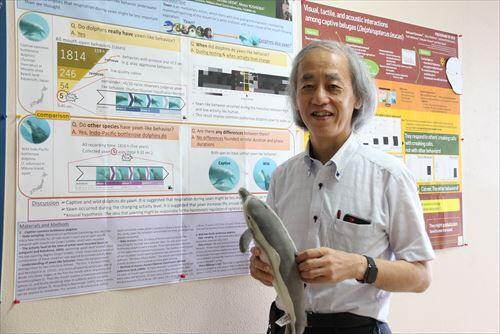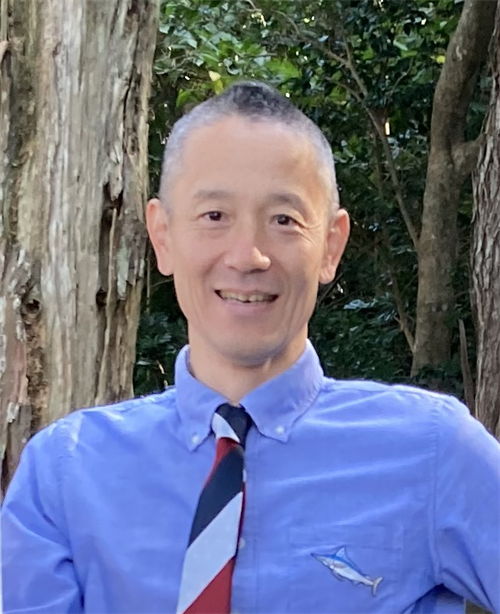Summary of our research
Genfu Yagi, a third-year doctoral student at the Graduate School of Bioresources, Mie University, collaborated with two professors, Dr. Tadamichi Morisaka and Dr. Motoi Yoshioka, both from Mie University. Additionally, the collaboration involved Professor Dr. Miho Murayama and her students, Ms. Huiyuan Qi and Ms. Kana Arai, from the Wildlife Research Center of Kyoto University. Associate Professor Dr. Yuki Kita from the Department of Biology at Tokai University and Mr. Kazunobu Kogi from the Mikurashima Tourism Association also contributed to the collaboration. The team developed a noninvasive age estimation method for dolphins using DNA extracted from fecal samples. The age estimation of wild animals, including dolphins, traditionally relied on long-term observational studies spanning their lifespans or methods that required the capture of animals. Due to these challenges, estimating the age of long-lived wild animals posed considerable difficulties. This study represents a pioneering achievement as it successfully applied epigenetic clock analysis using DNA extracted from non-invasive samples, such as fecal samples from wild aquatic animals. This research not only contributes to the understanding and conservation of the ecology of Indo-Pacific bottlenose dolphins but also marks a crucial step toward applying this methodology to other wild animals.
Age is fundamental information for studying the life history of organisms, encompassing the cycle of birth, maturation, and death. Also, the age information of long-life animals aids in predicting future population trends, analogous to our projections based on a demographic pyramid. The age estimation methods for wild animals are typically conducted through long-term observations and/or the analysis of biological samples, including teeth from the animals. However, conducting long-term observational studies is difficult, and obtaining biological samples pose challenges due to potential stress and negative impacts on the animals, as well as possible dangers to the researchers. Therefore, non-invasive age estimation methods for wild animals using samples that can be easily obtained without any impacts on both animals and researchers are required. In humans, changes related to aging have been linked to alterations in the mechanism regulating gene transcription and translation, known as epigenetics. Recently, age estimation in humans has been achieved using the frequency of a phenomenon within epigenetics called "DNA methylation". Our study applied this age estimation method to DNA extracted from dolphin fecal samples.
Despite challenges such as low DNA concentration in feces-derived DNA samples, which resulted in analysis difficulties and variability in results from the same sample, we successfully measured the methylation rates in two gene regions, GRIA2 and CDKN2A, from 36 samples. The methylation rates in both gene regions exhibited a correlation with age, allowing for the formulation of an age estimation model with an error of approximately 5 years for the maximum lifespan of around 50 years in Indo-Pacific bottlenose dolphins (Fig). This is the first study of epigenetic clock analysis for wild aquatic animals using DNA extracted from non-invasive biological samples, including feces.
Age estimation using DNA extracted from fecal samples has been scarcely studied in humans, livestock, and wild animals. Because the hydrolysis of DNA is accelerated in water, this success may be more easily applied to terrestrial mammals, which are more suitable for DNA preservation. It is expected that we can obtain age information from rare, large animals, which is difficult to capture using this method. The age information helps to understand the ecology of the species, including its lifecycle. The combination of the lifecycle and the demographic pyramid can predict the future extinction risk of the species and aid in building conservation measures for the species. We hope that age estimation using feces promotes understanding the ecology of wild animals and helps find ways for animals and humans to coexist.
https://onlinelibrary.wiley.com/doi/10.1111/1755-0998.13906

Researcher information

Yagi Genfu
Ph.D. student, Mie University, Graduate School of Bioresources
Specialized area:
Cetology
Current research field:
Development of noninvasive age estimation methods and life history studies for Indo-Pacific bottlenose dolphins

Morisaka Tadamichi
Professor, Mie University, Graduate School of Bioresources, Cetacean Research Center
Specialized area:
Bioacoustics, Ethology, Cetology
Current research field:
Description of interesting behaviors in cetaceans, Development of the elementary techniques for cetacean conservation, and Basic study for cetacean communication and society

Yoshioka Motoi
Professor (Vise President), Mie University
Specialized area:
Marine Mammalogy, Reproductive Physiology
Current research field:
Understanding of the mechanism of cetacean reproductive physiology, Understanding of the life history of narrow-ridged finless porpoises in Ise Bay
Murayama Miho
Professor, Wildlife Research Center, Graduate School of Science, Kyoto University
Specialized area:
Wildlife molecular ecology
Current research field:
Development of animal DNA database, research on genetic background of animal personality, and research on basic biological information such as age, kinship, and sex from genes.

Qi Huiyuan
Doctoral Student, Wildlife Research Center, Graduate School of Science, Kyoto University
Specialized area:
epigenetic clock
Current research field:
Development of epigenetic clocks for felids
Arai Kana
Doctoral Student, Wildlife Research Center, Graduate School of Science, Kyoto University
Specialized area:
epigenetic clock
Current research field:
Development of epigenetic clocks for Asian elephants
Kita Yuki F.
Associate Professor, Department of Marine Biology and Sciences, School of Biological Sciences, Tokai University
Specialized area:
Genome biology of Marine Mammals
Current research field:
Genetic diversity and group organization of small odontocetes

KOGI Kazunobu
Executive Director, Mikurashima Tourism Association
Specialized area:
Conservation biology, Cetology
Current research field:
Conservation of cetacean off Mikura Island, Description of fauna in Mikura Island